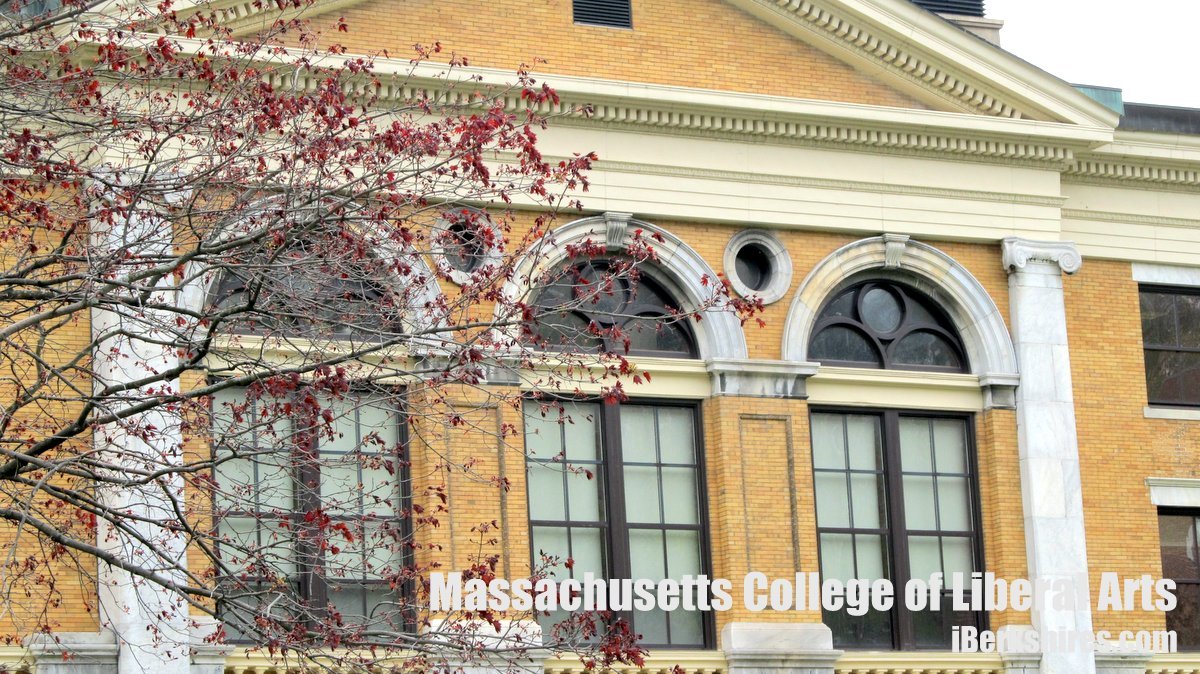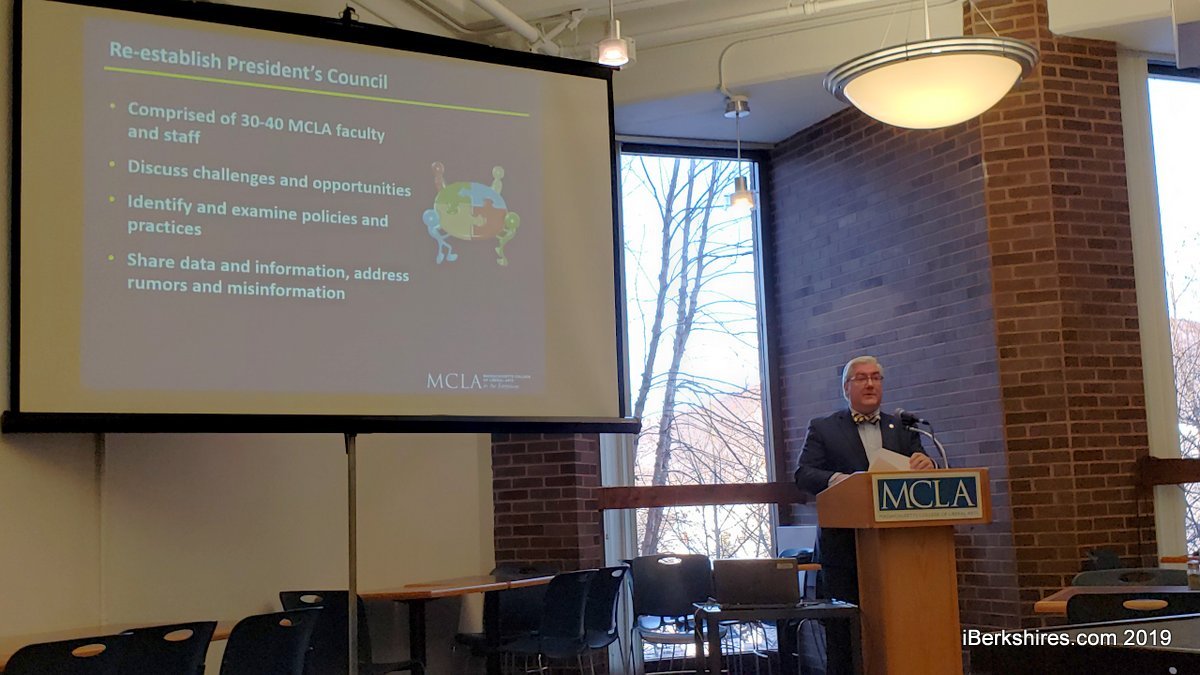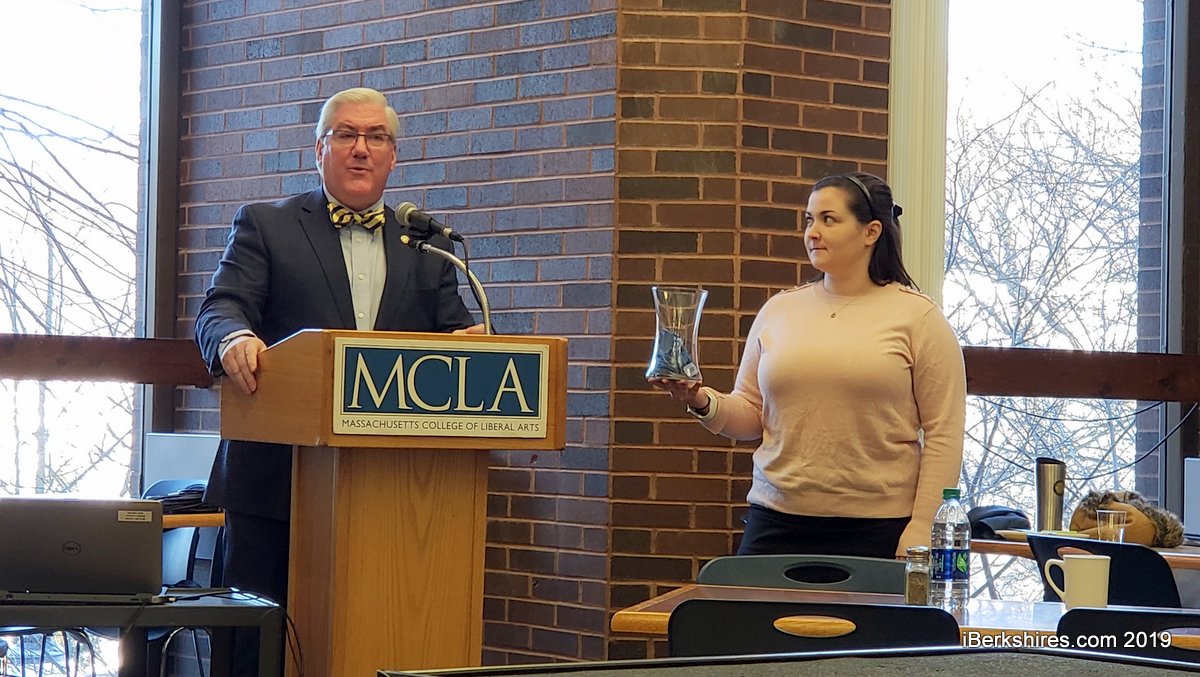

MCLA Opens 125th Year With New Strategies, Initiatives

NORTH ADAMS, Mass. — Some legislators are calling it the "year of education" but for Massachusetts College of Liberal Arts, it's not about one year but about 125 years of education.
The college will celebrate its quasquicentennial in 2019 with a series of events, exhibitations, signage and celebrations. President Jamie Birge announced the anniversary along with other college news as the spring semester kickoff breakfast held in the Centennial Room on Tuesday morning.
Established in 1894 as the North Adams Normal School to train teachers, the college has gone through a number of names and some significant academic and physical changes over the past 125 years. It became MCLA in 1997.
"Regardless of our name, MCLA over the years has reflected its historic public purpose to respond to the needs and demands of society," Birge told the gathering. "MCLA will celebrate its 125th anniversary in 2019 by inviting faculty, staff, students and alumni to form an anniversary committee."
Robert Ziomek, class of 1989 and vice president of institutional advancement, will chair the committee.
This year's commencement speaker will be U.S. Rep. Richard Neal, who represents the Berkshires in Congress. Neal will be presented with an honorary doctorate in public service, as will former Mayor Richard Alcombright. Also receiving an honorary doctorate, in humane letters, will be Shirley Edgerton, an alumna of MCLA and a former trustee.
The college is also moving forward with a new look in branding and marketing this year. The firm SimpsonScarborough, with offices in Washington, D.C., and California, has been working with the college community, Birge said, "as part of our strategic planning goal of improving internal communications and enhancing our external reputation."
The marketing firm came up with two concepts and then merged them as audience testing found preferences in both. Some of the new elements will be used almost immediately and the rest through the academic year. The estate of Helen Sinderman, class of 1944, provided the resources for this work.
The website's getting a makeover as well, with iFactory of Boston developing a model more accessible on mobile and user-friendly. That should be completed by the opening of the fall semester.
On a more internal note, Birge is resurrecting the President's Council, to be made up of 30 to 40 members to represent the college's more than 400 employees.
The council will focus on "discussions around challenges and opportunities for MCLA. We will identify and examine policies and practices that will enhance the leraning and teaching environment we will share data and information and address rumors and misinformation eachmember will be responsible to report discussion content to their colleagues and the presidents office will post meeting notes online for everyone to read."
Sometimes information can't be shared for legal reasons, or because it's incomplete or would hurt someone, he said.
"I'm under no illusion this council will solve our communication deficiencies but it has the opportunity to expand the information we can share with one another," Birge said.
The college is also working on its strategic plan, will open a Pittsfield location in February, and recently received a $360,000 Andrew W. Mellon Foundation grant to establish an Institute on the Arts and Humanities to explore connections that can increase diversity, equity, and inclusion.
But there are still external pressures on not only MCLA but other colleges to meet evolving needs of students, the economy and technology while maintaining financial health. Birge ticked off a list of colleges that have merged or closed because of their fragile finances.
"Although our finances are stronger than most of these institutions, we struggle under the competition to recruit and to retain students," he said. Still, the state only covers a third of the college's operating expenses — pushing more costs onto students and parents — and the endowment is only $13 million, compared to the similarly sized Hampshire College's $52 million.
Massachusetts State Colleges Association President Graziana Ramsden urged the gathering to get behind the Fund Our Future initiative to push the Legislature to direct more funding toward K-12 and higher education.
The public university system is being underfunded by $574 million, or about $20 million per college, she said. Even underestimating that amount drastically could mean $10 million per school.
"Our students and families need a foundation budget that guarantees students a high-quality, debt-free education," she said.
State Sen. Adam Hinds and state Rep. John Barrett III said it was critical to make more investments in education and believed this session will see some movement in that direction.
"When it comes to the new legislative session, it feels like this term is being really identified as a session to focus on education," Hinds said. "In many ways we could say this term that just passed was focused on things like criminal justice reform ... but this term, already here it is the third week in January and we've already had the governor, the speaker of the House, the Senate president, we need to double down on what we're doing in education and education funding."
.jpg)
He said there's a recognition that more of the burden has shifted to the local level and needs to be corrected. State Rep. Paul Mark, he pointed out, has been leading the charge against the decline in higher education fundingls. Since 2001, Massachusetts has reduced its per-student financing by $8,000, to $12,000 a year.
"That's the wrong direction we should be heading in education financing," Hinds said. "We do think that this year we're going to have a very serious conversation not only of those priorities but certainly on the revenue side. ...
"We have some sources of new revenue coming into the state but clearly not nearly enough."
Barrett, who graduated from MCLA, said there have been similar challenges in the past in convincing lawmakers and "everyday people" that an affordable path to higher-education creates opportunities.
"I'm one of 160 fighting for the smalles most remote area in the state of Massachusetts, trying to convince them that this school is important," he said. "Not only to education but for our economy and to be the catalyst for growth for many years to come."
Also making brief remarks were Chairwoman of the Board of Trustees Denise Marshall, Association of City, State and Municipal Employee Local 1067 Chief Steward Elizabeth Manns, Student Government Association Executive Vice President Celine Manigbas, and Mayor Thomas Bernard.
Bernard said he looked forward to continuing to work with the college. "It's time we look at small as a competitive advantage," he said.
Tags: breakfast, MCLA,















